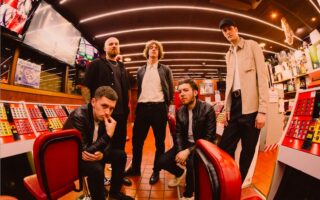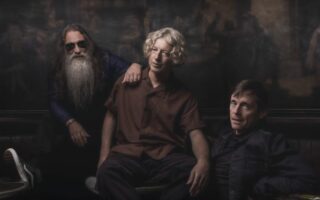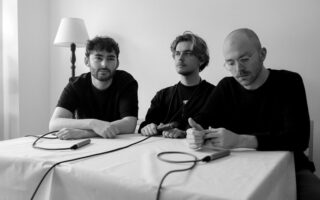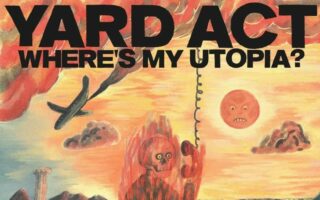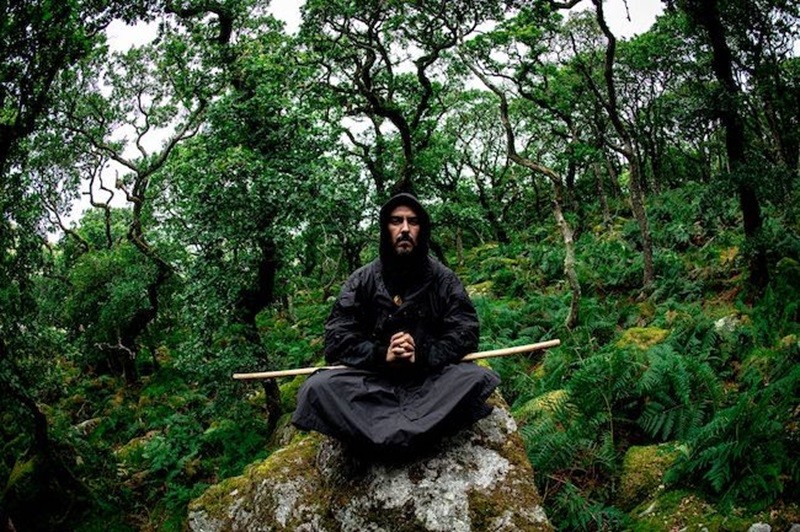
Dhani Harrison by Josh Giroux
Speaking with Dhani Harrison, even from the other side of the world, his enthusiasm for music is tangible.
The digital age has, as everyone knows, revolutionised music.
Fans can hear records before they get radio play. The power lies with the creator, they can release their music whenever they choose.
Click a button and you’re away. Yet the demand for physical product offsets that, and as such it’s a balancing act for record labels to release albums on all formats on the same date.
Or at least, that’s the understood methodology. Dhani Harrison, as both a musician and head of a label, can see from both perspectives, but also has his own:
“In running record labels and stuff and doing film scores, I don’t really believe in release dates anymore. The cycle is so short. If you’re coming out with a traditional album release then it lasts a week, then it goes away.”
Last October, Dhani Harrison released his second solo album Innerstanding, a brooding odyssey of ambience and electronica which gets a physical release this month.
Not instrumental, but not short on melodies, the record is uniquely beguiling, if not especially accessible, a fact its creator is acutely aware of.
“I’m not expecting it to be charting,” Harrison states with refreshing honesty, from a beach in Australia. “What I like is the longevity and that people can live with a record. Also, geo-politically, it was more important for me to get it out before more things happened!”
Innerstanding is broad in scope, tackling the environmental and political issues of the world today but, as Dhani Harrison states, time was of the essence with things moving so fast:
“On the first record I did (In Parallel), I was 40 and it was pre-pandemic. There was a lot of foreshadowing in that and I didn’t know that was going to happen. This record starts from that and goes to the other side, so it’s like a ‘before and after’, when the world changed, which for me works.”
I think everything that I’ve done, they read like historical documents, but you’ve got to release it in time for it to be timely and for it to make sense before something else bonkers happens and your record makes no sense anymore.
“I wanted to do a soft release digitally so people could get inside the record. Obviously, people’s lead times with vinyl production are horrible but ours weren’t too bad, so it was like, let’s get it out before Christmas, let everyone live with it over the holidays and then bring out the videos, the live show, do the vinyl, and then start touring. It was great.”
“With a record like this I’m going to be doing stuff with it for about a year. Because I’m releasing through BMG and Hot Records – which is my little label – they let us do it the way we wanted to do it. I like to give the record a fighting chance by giving it longevity. As I said, it’s not a pop record.”
Indeed it isn’t, with a scale and scope that befits its long gestation, as Dhani Harrison explains: “I started the album in 2020 and then it lived for a long time in different bits; some of it was as a film score, some of it was songs and it kind of grew and grew.”
“When I had a base, which I think was around lockdown 2 or 3, Graham Coxon started coming down to the studio and we did some stuff with him and some stuff for me. It built and built, and I wanted to get it out the year before (2022) but I was working on some other projects, and touring hadn’t really come back yet.”
“I kind of shelved it for a second. It wasn’t entirely finished until July of last year, but I’d already started another album with a band (which I can’t announce but is a really exciting world music project)…actually 2 or 3 records, and there’s another band project…so I’ve been militarily stockpiling records.”
“It got to the point where it was like this record has got to come out now so I could be free to get some shows in and just get on with the touring of this, then the touring of the next thing and then the next thing. So I’m going to be very busy this year!”
“It all landed slap bang in 2024, which is great as I love to be busy. I’ve been working so much in the studio. We were supposed to have a tour with ELO – I think – that was first going to be 2020, then 2023, we were supposed to be doing the whole of Europe then the world, but we didn’t go.”
“So waiting for the moment that gave (the album) its best shot and eventually it was like, well, let’s get the music out so we can get on with doing the next thing and the next thing.”
As a musical polymath – having been in bands, written soundtracks and now solo – Dhani Harrison has a built up a lot of contacts over more than two decades in the music industry.
Innerstanding features contributions from Liela Moss of The Duke Spirit, Australian singer Mereki and Coxon. However, in the latter’s case it’s no mere guest appearance, featuring on several tracks, with their musical relationship blossoming from being in similar circumstances: “We’d been hanging out in Los Angeles and we ended up both moving back to England after the first lockdown.”
“Graham and I had lost our groups – this was before he was doing The Ballad Of Darren and The Waeve – so we were feeling it out and trying to get back to being English and recording. He came down and started joking, ‘I’m going to be playing lots of saxophone’.”
“I didn’t know he played it! He came down with his sax and threw down lots of guitar. Obviously, Graham’s one of my favourite guitar players of all time.”
“We were out in the countryside trying to gather up a group of people. Graham’s played so much so that was when people like Toby (Butler) and Jeff (Wootton) got involved. It all just coalesced at the right time. Then Graham did a number one album with Blur, which he wasn’t even telling me about when he was working with me. It’s one of their best albums!”
“Before I noticed, he was working with Rose (Elinor Dougall) on a record and here’s The Waeve!,” Harrison continues. “I’m like, ‘Mate, you’ve just done my album, Blur, The Waeve and this graphic novel’. He was just cranking out the work so it was really good.”
When there was no-one who wanted to go out and be around people, Graham and I were just locked up in the studio. I think we’d started off mucking about because of the anniversary of Tom Petty’s death, and we’d done a cover of Love Is The Long Road and it was just me and him in a studio with a drum machine and guitars.
“We had so much fun doing that – you can find it online somewhere – it was so much of a laugh so we just carried on. He’d phone me every week and say, ‘I’ve got a day off, shall I come down?’, so he’d stay over and we’d just go mad in the studio.”
“It was a really great way of us getting back into community. That second lockdown winter was pretty long and it was pretty depressing, so for mental health and musical reasons it was an honour to have him come down and play. He’s such a great friend, player and man.”
Speaking with Dhani Harrison, even from the other side of the world, his enthusiasm for his trade is tangible. He’s prone to go into tangents which are never less than fascinating, as to be expected from someone with such a varied career. Does balancing different careers cause problems?
“Sometimes you get burnt out touring and you just want to go in the studio and be alone for a while,” he admits. “Collect your energy back; you’ve been giving too much energy to other people and outwards.”
“I’m quite a private person, I live in the middle of a forest in the middle of nowhere. I don’t get out much! I’ll spend time in the studio getting myself together then just go mad in the studio. You need to go out and blast it on the stage.”
“After the last few years of not having the touring industry, I’m ready to start playing a lot. Just getting those two Omeara shows under my belt, which were the first two solo show with bands in England, it was funny because the first show back I actually did after the lockdowns was the Royal Festival Fall with John McLaughlin, Nitin Sawhney and Anoushka Shankar with Ravi Shankar’s Orchestra.”
“No pressure! I had to sing a 20-minute song in Sanskrit. So after that warm-up it was really nice to play Omeara, which is a great little venue, the sound is so good in there. We really just blasted my own stuff, so I’m dying to get out as much as I can.”
The Omeara shows he refers to were two performances at the Hackney venue last autumn, playing both solo albums in full. The experience has given Dhani Harrison the taste for playing live again:
“That was really fun because we never toured the last album. We were getting ready to tour the whole of Europe – we had four sold-out nights at the O2 with ELO – but that whole thing disappeared in a puff of hand sanitizer, so we never got the chance to play the first record.”
“Me being a bit OCD, I thought the first thing I had to do was catch the few people who came out and supported me up to where we were in America.”
“We’d been playing the whole of America and finished that in 2019, then I’d gone into the studio working on some film scores. We were getting ready to do that again in 2020 and then it all fell apart.”
“I felt like it was unfair to just do the new record, so we did it chronologically: first half was the first album, second was the second. Funnily enough, I’d never done that before and it was so satisfying. I think that’s a great format.”
Although Harrison is speaking from Australia, he recently relocated back to the UK – a move about which he seemingly has no regrets, despite the weather:
“I’d been living in LA – on and off – for 20 years. I always knew I was going to come home and live in England. A lot of my team and collaborators were still out in Los Angeles, whereas now everyone I’ve been working with around the world, they’ve all moved back to their cities. There’s really not that many people who I was working with who are in LA anymore; most of them are back in London.”
“There’s such a great renaissance of music in London. Being back here and going to see things like Four Tet, seeing people like Nigel Godrich and Graham Coxon, watching things like IDLES and Wet Leg, and then hearing things like the John Francis Flynn record, I think there’s just amazing music coming out of England and Ireland at the moment.”
Grian Chatten’s album…there’s some really great stuff and it really lent itself to how I was feeling in America. I’m not really that big a fan of anything that’s going on there at the moment, so being back in England was really important. It was inspiring for me to be a part of what’s been going on in England since 2020.
While the current focus is on Innerstanding, Dhani Harrison also runs the label Dark Horse which was initially set up to look after the legacy of his father but is growing exponentially, as he explains:
“We brought it back from being a name that just goes on records to actually being a functioning label. It’s a joint venture with BMG and I run it with my partner David Zonshine, who’s worked with me for 17 years now. We were doing some press tours for In Parallel – because that came out on BMG – in Berlin, and I was with the heads of BMG and we were having some dinner one night.”
“We were walking back to the hotel and they suggested: ‘Wouldn’t it be cool if you guys had a little joint venture with us and you were a white-glove catalogue label?’.”
“I said, ‘That sounds really great because we’ve got so much stuff’. They said we’d also have access to their BMG catalogue, which is obviously extensive.”
“We talked about it for a few years then everyone made it work so we got to the point where it was, ‘OK, who’s our first artist?’. My father’s catalogue was still with Universal at the time and the goal was to eventually bring the George Harrison catalogue, publishing and masters under one umbrella.”
“That was a future goal, but then serendipitously we got a call from Shepard Fairey, who had been talking to Lucinda Garland – Joe Strummer’s widow – and she was looking for a place to start releasing Joe’s stuff.”
“They hadn’t released anything in 20 years since he passed away. She was courting the other major labels and Shepard said, ‘You can’t leave LA until you talk to David and Dhani’.”
“As soon as we met we were family, and she was a person I’d known my whole life. So Joe became the first artist, which was such a boost because there isn’t anyone who doesn’t like Joe Strummer.”
“Having Joe as our first artist really lifted the whole thing. We started getting calls from Yusuf / Cat Stevens: ‘Can I do my new album with you?’.”
“When you get calls like that you’re like, ‘Oh, this thing has legs. It’s going somewhere’. Then Leon Russell, and we’ve licensed some Nina Simone – our first female artist – and we’ve got one record coming out, which is one of my favourite Nina Simone records.”
“It’s just snowballed, and we got my father’s catalogue back and now that’s about to start releasing on Dark Horse.” (After our conversation, two Harrison albums – Wonderwall Music and Electronic Sounds – were announced for Record Store Day.)
“We’ve got everyone from Jon Lord from Deep Purple to some of the great classical Indian records like Ravi Shankar. I think the first release we did was a re-release of Chants Of India, which was recorded and mixed at Friar Park (George’s studio). My father produced it.”
It’s like a real family; a lot of the people who run these estates are widows. I know what we did for my mum, which was protect the catalogue and work with my mum to look after George.
“When Lucinda saw the work that we’d done with my dad’s catalogue, she trusted us. I said to her the first time we met: ‘We’re not a big label but I guarantee you one thing: you’re gonna be best mates with my mum’.”
“Sure enough they go on holiday now! It’s a family and Dark Horse was always a family. We plan to keep growing and protecting these catalogues. Also, I love design work so I oversee all the creative for every single record.”
“It’s so much fun, I get to choose the design. Obviously, we keep everything authentic to the original artwork but then Record Store Day let us do special editions and things like that. We can’t make enough vinyl but I love it.”
With the Rock & Roll Hall Of Fame recently announcing their shortlist, it recalls that 2024 marks the 20th anniversary of Prince’s induction, when he infamously stole the show with some breathtaking guitar during a performance of George Harrison’s While My Guitar Gently Weeps with his son, Tom Petty, Jeff Lynne and other luminaries.
Although a celebratory event, the memory now brings mixed emotions for Dhani Harrison, the first being surprise: “Is it really 20 years? Holy shit. That was one of the most far out things, and it continues to live a life.”
“At the time I didn’t think that much of it, but now it’s one of those things – obviously, Prince didn’t like things being on the Internet – and after he passed away, they were trying to remove all his stuff from the Internet.”
“After he passed away the only thing left that he didn’t own was that footage. So that’s why that video has hundreds of millions of views.”
“There’s gonna have to be a real definitive mini movie about what happened that day. There was just too many things…looking at the people onstage now, Jim Capaldi is no longer with us and he was one of my dear friends. Tom Petty is no longer with us and he was one of my dearest friends. So, when I see it, it’s very bittersweet.”
“It’s the same as the Concert For George; Michael Kamen conducted the orchestra and Gary Brooker was playing the organ. These things now have taken on a whole new life because they’re not here anymore.”
“Not to mention Prince! It’s funny, my whole perspective of that evening continuously changes. I have to say it’s probably the thing people ask me about the most. If you see me laughing on that video, that was nervous laughing where I knew was about to happen. I don’t think Tom and Jeff knew what was about to happen but I did!”
The tension between the Wilburys and Prince…they didn’t exactly get on, y’know. They put me in the middle as a buffer zone, but the tension between them made for one of the greatest Rock N Roll Hall Of Fame moments ever. It was just bonkers to be standing there, right slap bang in the middle of it and the only person who could see what was about to happen.
But enough about the past, what else does 2024 hold? “We’re going to be doing an event in London because, not only just the album, but when we first brought out the digital version of the record last year we shot a full taping of the whole album, start to finish, in the round.”
“It was a very good group of people with a few extra stand-ins, like Alex White from The Fat White Family on saxophone, Liela Moss, Mereki and my band, which consisted of Toby Butler – who I was in a band with once called Roman Remains – Donavan Hepburn, who was in ELO and I toured with from the previous album cycle, and then Jeff Wootton from Gorillaz on guitar.”
“And Josh Giroux – who is my collaborator – did all the artwork and photography for the record and he plays keys and guitar. He’s been in my band for a long time, he’s irreplaceable. A wonderful guy.”
“We shot that in London in Acton in a sound stage, and that’s also being mixed in ATMOS as we speak. There will probably be some sort of ATMOS presentation of that with Dolby in a few months.”
As for more live shows, Dhani Harrison is characteristically positive: “The emphasis is going to be trying to play live around Europe as much as possible.”
“I don’t know who I’m going to have; I might lose Donavan to ELO again! Having toured with Donovan with ELO, there might be a slight change in the band, but it was mostly this band fielded out of England, whereas the last band was fielded out of America. Hopefully, we’ll be doing summer festivals and things like that.”
“Whatever I can do that’s appropriate is what I’m going to be doing.” A mantra for Dhani Harrison himself.


